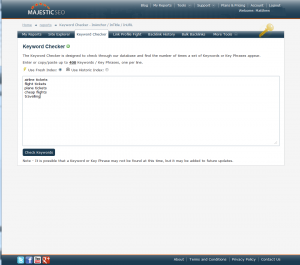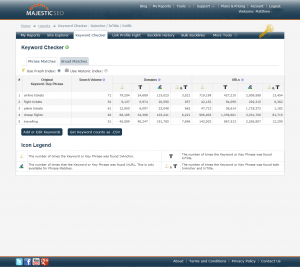Today we are really excited to add a new twist to our offering in the form of a Keyword Checker and bulk Keyword Checker.
From today you can type a keyword into our home page instead of a web URL and start to see how many web pages use the phrase in the Anchor Text or in the title of a URL or a domain. These are commands that were once available in some search engines, but the functionality was taken away. We assume it was deemed to valuable for the general SEO public to have.
We have also created a bulk keyword checker tool, designed to let you add hundreds of keywords into a list and see these metrics or export them as a CSV file.
Why is this useful?
You now have the ability to see how competitive key phrases are in ORGANIC search. Until now, SEOs have had to rely largely on Google’s paid search keyword tool bench-marked against its expected cost to rank in Adwords to make assessments as to how competitive a phrase is. However – there is a marked difference between the nature of organic and paid results and how you succeed in search partly depends on knowing how to blend the channels.
In its raw form, this is a great new research tool which we hope users will delve into. What is more important to people according to the “Big Data” map that is the web? “airline tickets”, “flight tickets” or “plane flights”? Well now you can find out in a trice.

You can always test out the “good stuff” over on the live keyword checker tool, but you can cut and paste hundreds of keywords in at a time. The actual number depends on your subscription level – with silver users (£29/€39/$49/mth) currently getting 150 phrases at a time. The results are currently shown as two sets of counts: Phrase match and Broad match.

Can I see the ACTUAL domains that use these?
Not right now – but we are constantly developing. Ever since in:url, in:title and in:anchor was stripped from advanced search engine commands, this feature has been unavailable to most users. We are reincarnating the features, but rebirth isn’t instant. We hope you will find value in this new feature and would love to especially see posts about how you might blend this data with PPC data to work out whether to focus on PPC or Organic for any given phrase.
Did we develop anything else while we were at it?
Wow – you guys are DEMANDING. OK – we sussed out how much people searched for most of these phrases and created a “Volume Score” which is a 1-100 scale for each phrase showing how often we believe it is searched for. A high number means a very highly searched phrase. We have embedded these numbers into the reports as well, so that when you analyse the phrases, you can make judgements in balancing search volumes with organic ranking challenges.
- How Important will Backlinks be in 2023? - February 20, 2023
- What is in a Link? - October 25, 2022
- An Interview with… Ash Nallawalla - August 23, 2022







Really exciting stuff, well done guys! Going to have lots of fun experimenting with the data.
July 30, 2012 at 12:23 pmGood news.
One question. Can I see some data about how deep is the Index and how much data does it contain?
July 30, 2012 at 12:52 pmHi Dimitri,
A good question. I assume you are referring to the multi-language dictionary size. It’s important to note that the current dictionary is merely a seed set, drawn from multiple sources, and we hope it will grow it substantially as a result of user queries. We may consider releasing more data in the future, but for now, we can say that it is measured in the tens of millions.
Steve
July 30, 2012 at 1:47 pmFantastic, using this know-how Majesticseo could easily build up their own search engine with good ranking and searchability.
July 30, 2012 at 1:10 pmNice update !
July 30, 2012 at 1:23 pmLooks like there is no difference between “Phrase” and “Broad”.
Hi Quentin,
For single words, Broad and Phrase will be equivalent. For multiple words, the delimiter is white space and punctuation.
For example – given the keyprase “french cheese”, it gives a phrase match of 954 InAnchor, and a broad match ( matching “cheese” and “french” in any position ) of 1,915 InAnchor.
Hope this helps – if you have some language specific examples where it isn’t splitting phrases appropriately, please drop us a line on the support center.
Steve
July 30, 2012 at 1:36 pmI think this is a new quality in link and competition analysis… Congratulations!
July 30, 2012 at 1:28 pmI think that it is just work for global search volume. Are you planning to add the feature of checking local competition or local search volume on Google? For instance, I’m working on Turkey’s SEO market and I want to see search volumes for Turkey. Is it possible in near?
July 30, 2012 at 3:30 pmHi,
We indeed show global search volume, it’s unlikely we’ll be adding local search volumes in the future because the main objective of our tool is to quickly return stats based on our own index, this way we avoid creating big dependency on 3rd parties that might not be handles volumes of data that we require in short time frame.
So our tool isn’t designed to replace fully featured keyword research toolsets that have local search volumes, but rather help augment them with additional information that would otherwise be unavailable.
July 30, 2012 at 5:05 pmJust played around with it, and looks like it’s going to be incredibly useful. Biggest thing will be to figure out competitive benchmarks, but after doing some comparisons of keywords/phrases, you can certainly get a good idea on how to analyze the numbers.
July 30, 2012 at 4:35 pmExcellent work by Majestic. One more reason to stick with and promote Majestic over OSE. One question. How do you interpret the search volume number?
Thanks,
Dave Keys
July 30, 2012 at 8:27 pmHi Dave,
Thanks for kind words! The best way to treat “Search volume” as relative score to help order keywords in order of global search volumes – we’ve scaled them down to 0-100 using logarithmic approach to avoid spikes.
July 30, 2012 at 11:13 pm> Excellent. Thanks again for an awesome tool. It will save me a lot of manual work on GAWKWT.
August 1, 2012 at 11:57 pmDo you get the InTitle, Inanchor and InURL data from your own database? The reason I ask is that there’s a massive difference between the figures that your Keyword Checker tool and Google returns.
July 30, 2012 at 11:55 pmHi Peter,
All stats come from our own extensive link database. It’s normal for counts not to be exactly the same as other search engines reports, the reasons are as follows:
1) we provide EXACT counts for domains/URLs – typicall search engines provide rounded estimates
2) when comparing make sure you do like for like comparison, ie: allintitle phrase match vs the same
In the past we’ve run extensive analysis on stats from historical index and we had very high correlation with Google’s figures – this does not mean the numbers will be exactly the same though.
July 31, 2012 at 1:26 amThis is confusing to me, for example I search it with term “guest blogging” there is no search volume
when I search using adward tool, the search volume is different
for many keywords this tools is showing very less result,
July 31, 2012 at 9:40 amHi,
AdWords tool will have access to full set of keywords used in Google, we don’t have access to it, instead we try to produce our own statistical data based on our own index and allow fast queries of this data afterwards.
Copy/paste data from AdWords tool into our and we’ll give you our own inanchor, inurl and intitle stats!
August 1, 2012 at 11:40 amWelcome back in:anchor . I knew you come back one day. I only hope it’s not too late and in:likes ; in:twits ; in:g+ and other “in:checkins” didn’t take all the place for you to play 🙂
July 31, 2012 at 11:24 pmis fantastic, you can see the competition is doing at a glance, your improvements every day things a lot easier to save precious time that can be devoted to many other operations.
August 2, 2012 at 6:10 pmI am not much into Majestic SEO Tool, but after reading this, i think i should give a try one more time
August 9, 2012 at 11:49 amI think the keyword too is great.
I had a great idea today that I think would make a great addition MajesticSEO:
In short if Citation flow and Trust flow could each have a graph that updates daily (weekly?) so people can see how their Citation flow and Trust flow improve (or get worse) over time for their website(s).
August 17, 2012 at 5:15 amGreat news, I was hoping this feature would be launched some time soon.
August 23, 2012 at 11:35 pmExcellent! I’m going to experiment with this.
October 9, 2012 at 8:42 pmI was wondering about the “Volume Score” you mentioned in the blog post.
Is the volume from SEMrush or Google or your own volume numbers based on how many MajesticSEO user queries there is?
October 11, 2012 at 6:20 amIt is algorithmically estimated. We did not want to call it a “flow” metric, because it is not using the same logic as flow metrics. I can’t be especially specific about it, except to say we combined some data with some of our own logic and knowledge to come up with this data.
October 11, 2012 at 8:13 am> Thank you Dixon.
We appreciate the explanation and also we understand why you cannot go into much detail.
October 16, 2012 at 6:39 amReally Amazing Tool will use it. Thanks for such nice stuff
December 11, 2012 at 7:46 amI think this is a new quality in link and competition analysis… Congratulations!
December 27, 2012 at 7:55 am